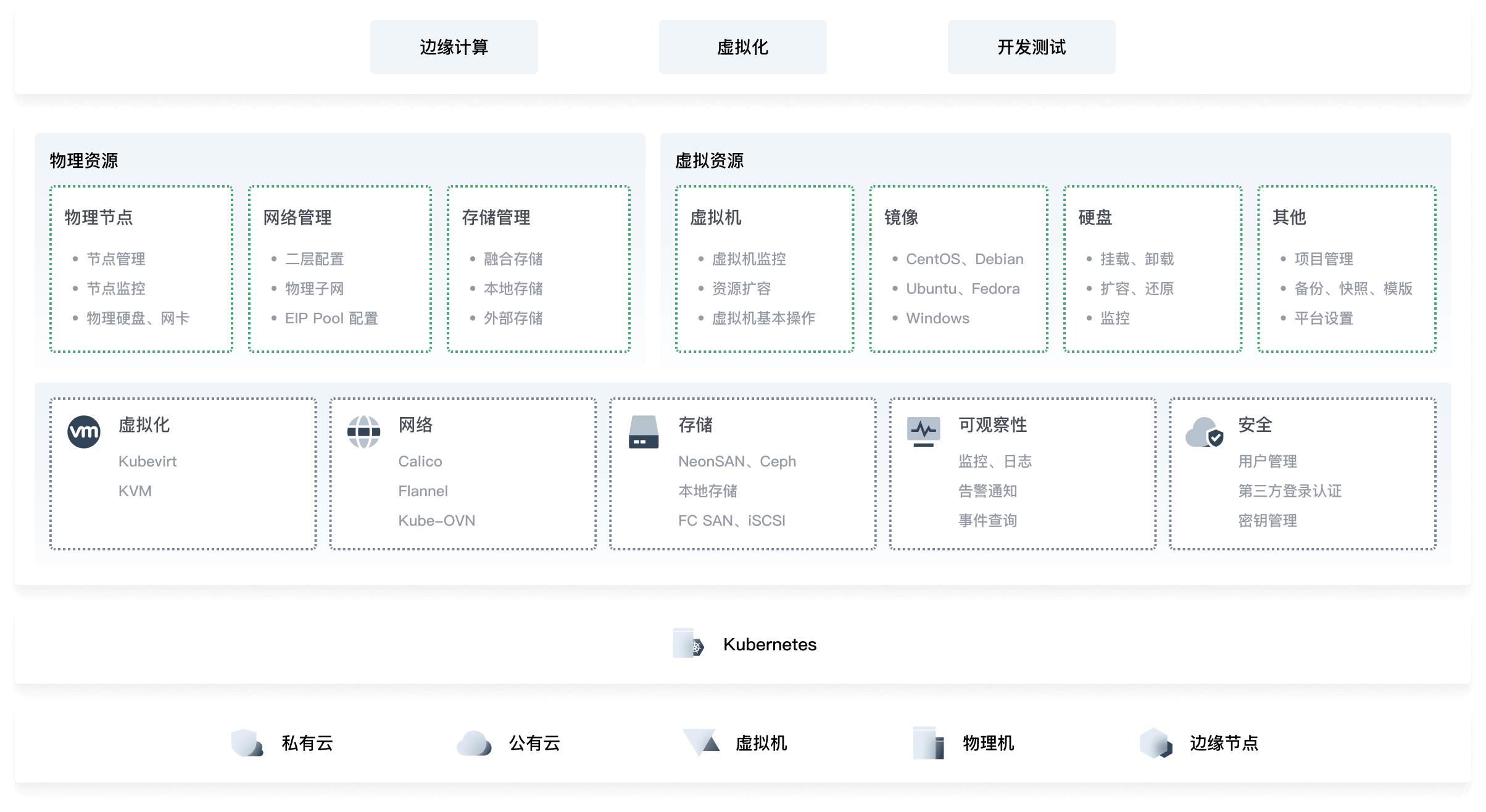KubeSphere Virtualization
KubeSphere Virtualization (KSV) Lightweight VM management platform built on top of KubeSphere. KSV supports single-node and multi-node modes for deployment and provides easy-to-use services to meet enterprise-grade requirements of virtualization.
Architecture
KSV uses a cloud-native architecture that decouples front-end and back-end services. KSV supports single-node deployment with a minimum specification of 4 CPU cores and 8 GB memory. This service frees you from the dependency of the underlying infrastructure. You can run KSV on x86 or ARM servers that support virtualization.
- Edge computing
- Virtualization
- DevTest
Physical resources
Physical nodes
Node management
Node monitoring
Disks and NICs
Network management
Layer 2 networking
Subnets
EIPs
Storage
Converged storage
Local storage
Third-party storage
Virtual resources
VMs
Monitoring
Resource scaling
Common operations
Images
CentOS、Debian
Ubuntu、Fedora
Windows
Disks
Mount and unmount
Resize and recovery
Monitoring
Others
Project management
Backup, snapshots, and templates
Platform settings
Virtualization
Kubevirt
KVM
Networking
Calico
Flannel
Kube-OVN
Storage
NeonSAN、Ceph
Local storage
FC SAN、iSCSI
Observability
Monitoring and logging
Alerting
Event query
Security
User management
Third-party login authentication
Key management
Kubernetes
Private clouds
Public clouds
VMs
Servers
Edge nodes

Features
As an enterprise-grade virtualization platform, KSV provides an easy-to-use web console, helping users quickly achieve enterprise hardware resource virtualization.
Node management
Quickly obtain summary information about cluster nodes and status of each node.
Network management
Configure physical networks, EIPs, VPCs, and virtual subnets.
VM management
Create or delete VMs, use VM snapshots, and remotely connect to VMs.
Image management
Manage system images used for VM creation.
Disk management
Manage VM disks, use disk snapshots, and expand disk capacity.
Project management
Separate resources into projects and control user permissions based on user roles.
Scenarios
KSV offers lightweight, flexible, and simple delivery. Built on top of the cloud-native Kubernetes architecture, KSV can integrate with various external software and hardware to provide enterprise-grade solutions in different scenarios.
Resource pooling
A cloud-native virtualization platform self-developed by QingCloud. This service provides excellent compatibility and supports ARM and x86 architecture. KSV improves resource utilization and supports the reuse of legacy hardware. You can connect to third-party storage and create VMs in seconds.
Edge computing
Support for a minimum specification of 4 CPU cores and 8 GB memory, single- or multi-node deployment, and reuse of legacy hardware such as PCs, industrial PCs, and servers. KSV applies to diverse scenarios, and data can be computed on the nodes that are nearest to your locations. This achieves real-time response, data masking, and reduced bandwidth costs.
Hybrid deployment of containers and VMs
Integrated deployment of KubeSphere and KSV on top of Kubernetes. This simplifies your infrastructure and improves O&M efficiency.












